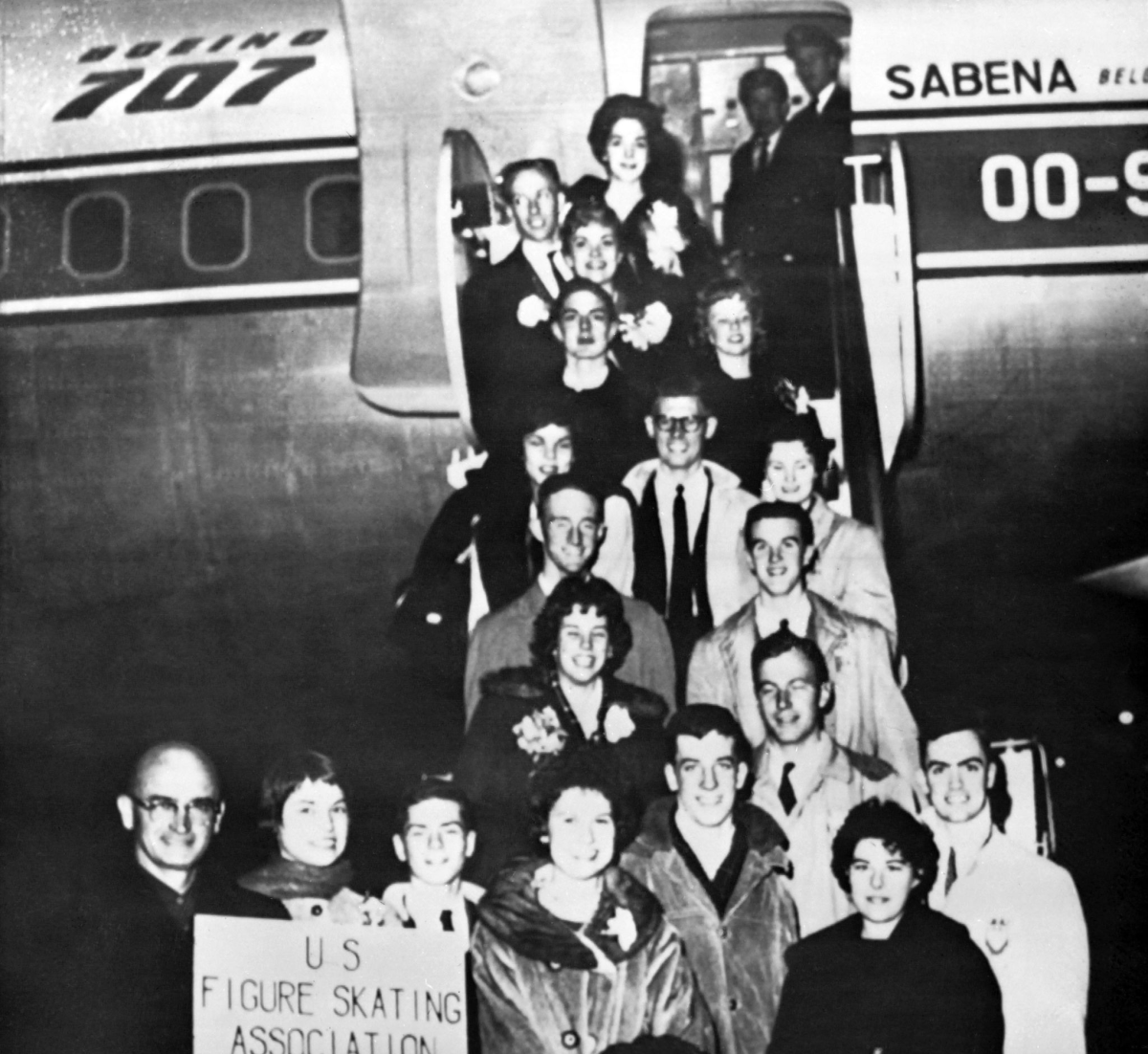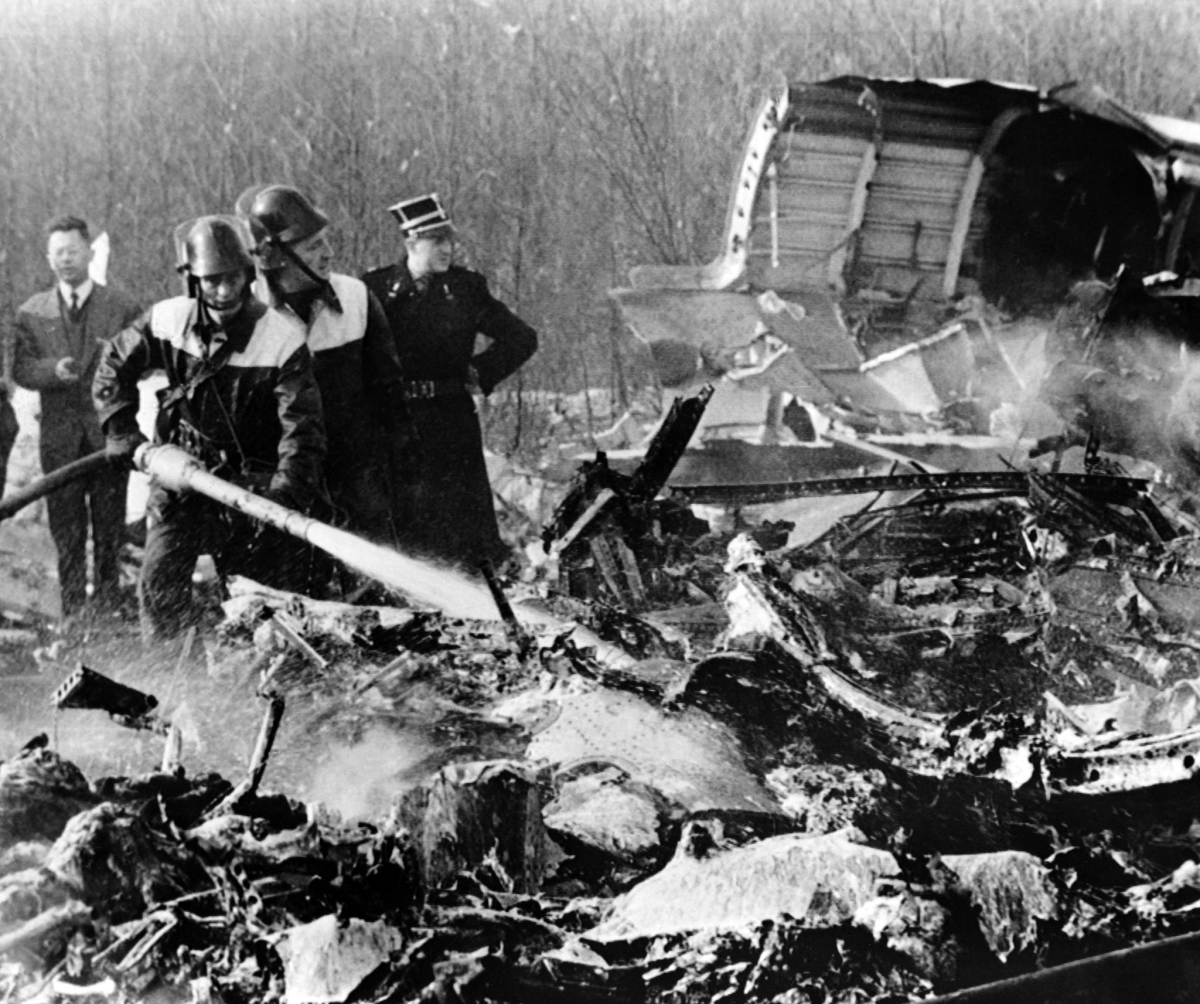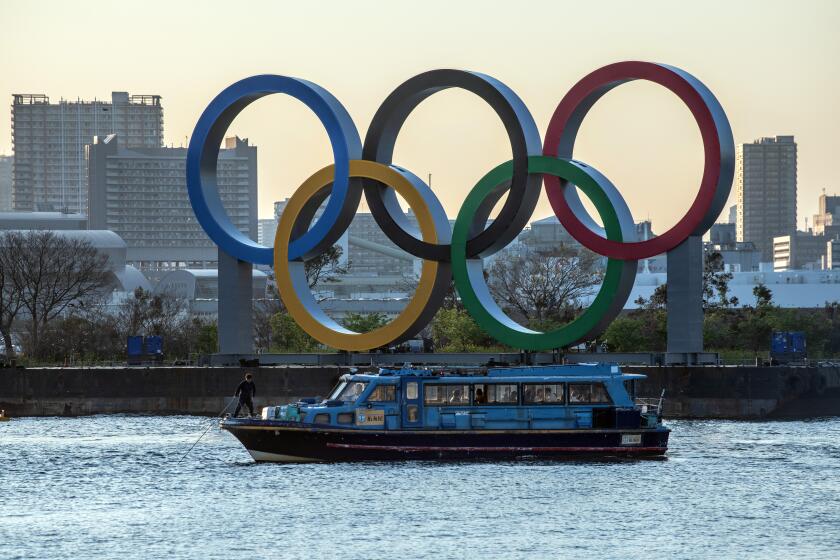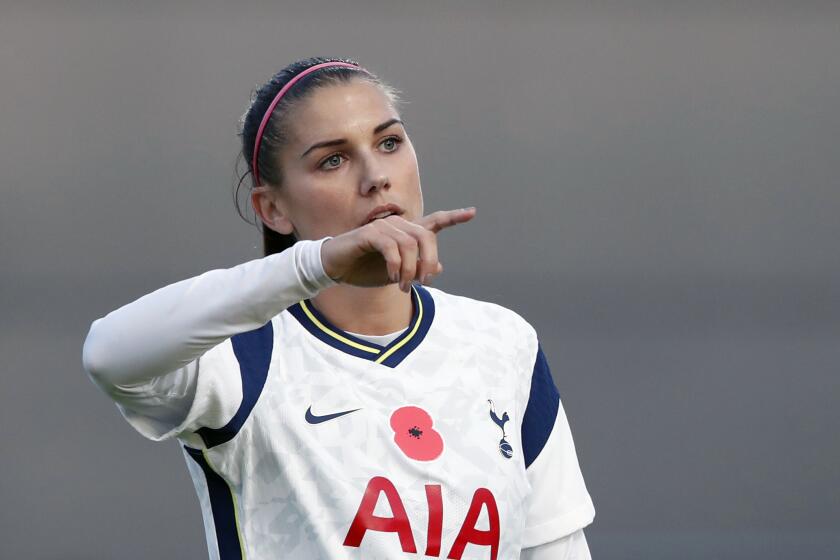Column: Sixtieth anniversary of U.S. figure skating plane crash conjures heartfelt memories

- Share via
The memories flood back at random times and stir the ache etched in Carol Heiss’ heart 60 years ago, when a plane crash devastated American figure skating and changed the course of the sport.
Heiss had roomed with the enchanting Laurence Owen for nearly four weeks around the 1960 Squaw Valley Olympics, and they had become friends. After Heiss won the gold medal, she told Owen that she would have to uphold a championship tradition. It was easy to imagine Owen, at 16 a beautifully fluid skater, following Heiss’ golden path. An image of Owen graced the Feb. 13, 1961, cover of Sports Illustrated, which dubbed her “America’s most exciting girl skater” in advance of that year’s world championships in Prague.
Heiss had spent happy weeks in East Lansing, Mich., training with Greg Kelley and Doug Ramsay, who finished second and fourth at the 1961 U.S. championships and made the Prague team. One of the coaches on Sabena Flight 548 was Edi Scholdan, who had coached Heiss’ husband, 1956 men’s Olympic champion Hayes Alan Jenkins, and her brother-in-law, 1960 men’s gold medalist David Jenkins. The skating community was small, and it was close.
As much money is at stake, the Summer Olympics in Tokyo have to be canceled, writes columnist Dylan Hernández.
The community was shattered when 18 skaters, four officials, six coaches, and six team and family members were among 73 people killed when the plane carrying the U.S. team plunged into a field near Brussels on Feb. 15, 1961. A charred copy of that Sports Illustrated issue was found amid melted skates and tattered team gear.
The cause was never determined. No one survived. But they come back to life for Heiss at ordinary moments, not only on the anniversary of the tragedy. “They’re always a part of us. It isn’t just today, or around this time, that I remember them,” said Heiss, a longtime coach in the Cleveland area.
“I could be at a competition or I could be at the rink or I could think of something funny that one of them used to say at the rink. When I watch kids have a lot of fun at the rink, I think what enjoyment we had in summer skating.”
Kelley and Ramsay were 16. Diane Sherbloom of Los Angeles, who won the U.S. ice dance title with Larry Pierce, was 18. Dona Lee Carrier of the Los Angeles Figure Skating Club, who took second place in ice dance with Roger Campbell of North Hollywood, was 20. Pairs skater Laurie Hickox was 15. Carrier, Campbell and 17-year-old Rhode Lee Michelson of Long Beach were coached by Bill Kipp of Downey. “It isn’t just the skaters that we lost, but the officials and coaches,” Heiss said by phone last week. “Edi Scholdan, Bill Swallender, they all had good skaters. You don’t know what they would have done in the future.”

Laurence Owen’s free-skate performance at the 1961 U.S. National Figure Skating Championships.
The 60th anniversary reawakened sad memories for Tenley Albright, the 1956 Olympic gold medalist. Speaking from the Skating Club of Boston’s trophy room during a webinar Saturday, her voice broke as she recalled friends killed in the crash. “I’m thinking of the trophies that might have been added,” she said.
The team’s star was Laurence (pronounced Lau-RENS) Owen, a charmer with a pixie haircut. She was coached by her mother, nine-time U.S. women’s champion Maribel Vinson Owen, who dispensed tough love by the barrel. Vinson Owen was the first female sportswriter published in the New York Times; Laurence wrote soulful poems. Laurence’s older sister Maribel Jr., called Little Maribel, had recently won the U.S. pairs title with Dudley Richards and was on the plane as well.
“Laurence was her own person, and she was a free spirit,” Heiss said. “The way she dressed, it wasn’t kooky, it was just she had her own style and her own style of skating and just always seemed to be happy and to go with the flow.”
Among Vinson Owen’s students was Frank Carroll, who later became a coach in Southern California and guided Michelle Kwan, who matched Vinson Owen’s record of nine U.S. singles titles, Linda Fratianne, Evan Lysacek and others to national, world and Olympic medals. He channeled the lessons Vinson Owen had taught him, often wishing he could have consulted her when a skater was stymied by a new move. Like others who knew those who died, Carroll imagines what they might have accomplished had fate been kinder.

“Oh, God, yes I do, all the time,” he said by phone from his Palm Springs home. “I know that Little Maribel would have married Dudley because they were very much in love. And I was thinking of Maribel getting older and me starting to teach skating and if she saw something that she thought I was doing that was not appropriate or not according to the doctrine, she would have picked up the phone and would have corrected me on the spot.
“I can just picture us, me as a middle-aged person and her as an old lady, arguing about skating, being in a room and screaming at each other because she would definitely voice her opinion. She wouldn’t care whether I had a world champion as a student or not. She’d make sure I was corrected. I also think Gregory or Bradley [Lord, the 1961 U.S. men’s champion] would have been my competitors teaching skating. They would have produced great skaters. They had wonderful knowledge.”
The loss of the best and brightest was expected to set American skating back immeasurably. Some young skaters were put on an accelerated track, and 1960 bronze medalist Barbara Roles — who roomed with Heiss and Laurence Owen at Squaw Valley — returned from retirement. Established coaches Carlo Fassi and John Nicks were lured to shepherd the next generation. Nicks, a former world champion pairs skater, came to Paramount to replace Kipp.
“The first one or two years were difficult,” Nicks, 91, said in a phone interview. “Bill Kipp was extremely popular and very successful, and replacing him wasn’t looked kindly upon from certain people. Understandably so. But after two or three years, I worked pretty hard and managed to have some success, and from then on things got a lot easier.”
Kipp had coached Peggy Fleming, who worked with Nicks for one year before switching to Fassi. Fleming’s gold medal at the 1968 Winter Games signaled the renaissance of American skating.
U.S. soccer star Alex Morgan is preparing for the SheBelieves Cup, after a year in which she contracted COVID-19 and also had her first child.
“One of the reasons I always admired the American skating scene was the confidence and the optimism they always seemed to have,” said Nicks, who coached Tai Babilonia and Randy Gardner, Sasha Cohen, Kristi Yamaguchi and other world-class skaters. “I thought the recovery from that tragedy by a skating nation was just incredible. It verified everything I had thought about American skating for many years.”
From the tragedy came one small blessing: the formation of the U.S. Figure Skating Memorial Fund, which has disbursed more than $20 million to support skaters’ training and educational costs. The fund allowed Fleming to buy skates and helped current U.S. men’s champion Nathan Chen develop his extraordinary talent. The fund honors the past by looking toward the future.
“One thing it has taught me is that we have friends for life. We are so fortunate to have the skating family,” said Heiss, 81. “That just makes me treasure my skating friendships even more because you just never know what tomorrow is going to bring.”
More to Read
Go beyond the scoreboard
Get the latest on L.A.'s teams in the daily Sports Report newsletter.
You may occasionally receive promotional content from the Los Angeles Times.









